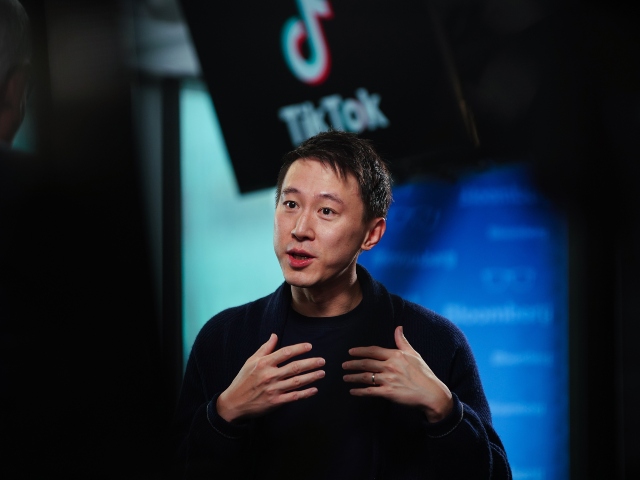The University of Texas at Austin (UT Austin) has blocked students from accessing the China-owned app TikTok on its Wi-Fi network. The move comes after Texas Governor Greg Abbott (R) banned the Chinese app from use on government devices.
UT Austin told students in a Tuesday email obtained by the Hill that the school is barring the Chinese app to comply with Gov. Abbott’s December directive to “eliminate the cybersecurity risk posed by TikTok.”

Shou Zi Chew, chief executive officer of TikTok Inc., during an interview at the TikTok office in New York, U.S., on Thursday, Feb. 17, 2022. (Christopher Goodney/Bloomberg/Getty)
“Today, the university blocked TikTok access on our networks,” UT Austin said in its email. “You are no longer able to access TikTok on any device if you are connected to the university via its wired or WIFI networks.”
“As outlined in the governor’s directive, TikTok harvests vast amounts of data from its users’ devices — including when, where and how they conduct internet activity — and offers this trove of potentially sensitive information to the Chinese government,” the university added.
UT Austin’s athletic department has a TikTok account with nearly 260,000 followers, but it has not posted on the Chinese platform since November, the report noted.
Prohibiting the use of TikTok appears to be one of the nation’s very few bipartisan issues. Earlier this month, New Jersey Gov. Phil Murphy (D) ordered the app to be banned. Meanwhile, at least 24 other states have taken similar action.
Following Murphy’s ban of TikTok in New Jersey, he and Utah Governor Spencer Cox (R) sent a letter to other governors, calling on them to take the same initiatives.
“As the federal government works toward an overarching solution, we encourage our fellow Governors to join the growing number of states taking action,” the governors said in their letter. “By acting against foreign cyberthreats like TikTok, Governors can protect our states, bolster national security, and ensure our citizens can trust our states’ systems.”
UT Austin is not the only school to be taking action against TikTok in an attempt to protect its students.
Earlier this month, it was reported that Seattle Public Schools is suing TikTok, among other social media platforms, accusing them of creating a “mental health crisis among America’s youth,” resulting in students engaging in self-harm.
TikTok is known for being a danger to kids and teens who use the app.
On Friday, a 12-year-old girl in Argentina died after participating in the deadly “choking challenge” popularized on TikTok. Similarly, a 14-year-old and 12-year old in the UK died last summer while attempting the same challenge.
The Chinese app has also been the platform for another challenge involving children cooking chicken in NyQuil, “presumably to eat,” the FDA warned last September. Another TikTok challenge in 2020 involved urging users to take large doses of the allergy medication Benadryl (diphenhydramine) to induce hallucinations. The challenge resulted in reports of teens being rushed to the hospital, and in some cases, dying.
In addition to being dangerous for kids and teens, TikTok is also a national security threat. Last month, it’s Chinese parent company ByteDance even admitted that it had obtained private user data on American journalists.
In November, FCC Commissioner Brendan Carr declared that “TikTok is China’s digital fentanyl” and banning it “is a basic IQ test for the [Biden] administration,” adding that China shows a “very, very different” version of the app in China than it does in the United States.
You can follow Alana Mastrangelo on Facebook and Twitter at @ARmastrangelo, and on Instagram.

COMMENTS
Please let us know if you're having issues with commenting.